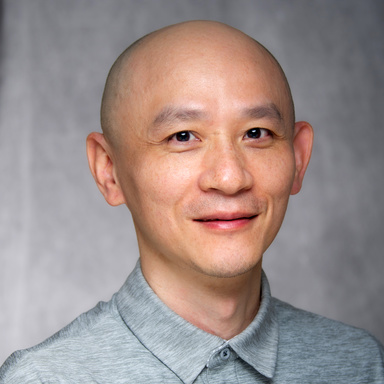By Will Bower and Teja Pritchard
Yu-Hsiang Wu, professor in the Department of Communication Sciences and Disorders in the College of Liberal Arts and Sciences, was recently interviewed on the JAMA Otolaryngology-Head & Neck Surgery podcast.

Wu discussed his paper, “Hearing Aid Service Models, Technology, and Patient Outcomes: A Randomized Clinical Trial,” and research findings.
Learn more about Wu’s research, podcast experience, and why he is passionate about his work in this Q&A.
Tell me about the research that led to this podcast interview. What results did your research yield?
Our study is the most comprehensive comparison to the data of different hearing aid service delivery models and technologies. We evaluated three service models: traditional audiologist-fitted (AUD), over-the-counter (OTC), and a hybrid model in which audiologists fit OTC hearing aids. While all three approaches led to positive outcomes, patients fitted by audiologists (AUD) consistently experienced better results. We also compared two levels of hearing aid technology—high-end versus low-end—and found no significant difference in patient outcomes between them.
What interested you in examining the impact of the hearing service model and technology on patient outcomes?
Hearing loss is recognized as a significant public health concern. Although hearing aids can improve communication, quality of life, and social and emotional well-being—and may even help reduce cognitive decline—their adoption rate remains low. While stigma and a lack of perceived need contribute to this issue, poor affordability and limited access to hearing aid services and devices are among the most cited barriers. This motivated me to investigate whether the AUD service model and high-end hearing aid technologies produce better patient outcomes that justify their higher costs, compared to the OTC model and lower-end technologies.
How did you find out the JAMA Network wanted to interview you?
About a month before the paper was scheduled to be published, I received an email from the JAMA Network asking whether my co-authors and I would be willing to record an audio interview about the study. I was surprised and honored by the invitation.
How did it feel to talk about your work on a podcast?
It was a completely new experience for me. I can talk about my work to colleagues and students for hours in conferences or classrooms without any problem. But during the podcast, once I realized I was being recorded, I became incredibly nervous and struggled to find the words I wanted to say. I really admire people who can speak confidently in front of a camera or microphone. Fortunately, the podcast host did an excellent job guiding me through the conversation, and the recording engineers were supportive—they allowed us to redo parts and re-record as needed, which helped.
Do you have any plans to expand this research going forward?
Yes, we have a new five-year project funded by the National Institute of Health (NIH) to continue studying OTC hearing aids. In this project, we aim to gain a comprehensive understanding of the OTC hearing aid user’s “journey” and the factors that influence its success. Specifically, we will examine how individuals decide between OTC and traditional audiologist-fitted hearing aids, evaluate the long-term outcomes of OTC hearing aid users, and explore hearing healthcare behaviors—such as whether individuals seek professional care—following unsuccessful OTC experiences.
Anything else you would like to add?
This journey took many years—from writing the grant and conducting clinical trials to analyzing the data and publishing the manuscript. The clinical trials were also impacted by COVID-19, which added to the challenges. Therefore, it is a strange feeling to see all that work condensed into a nine-page paper. It took the effort of many people, and I am profoundly grateful for all the support I received.